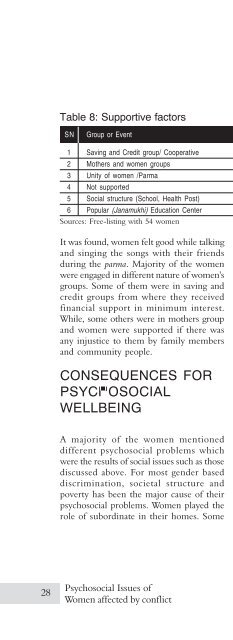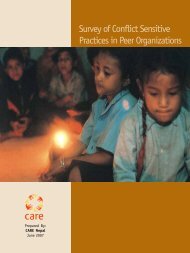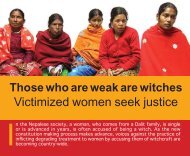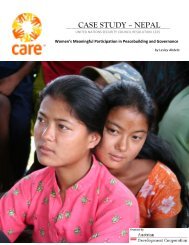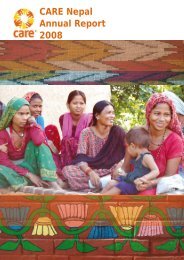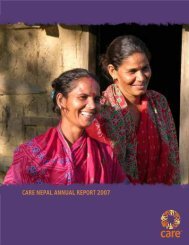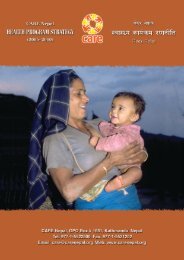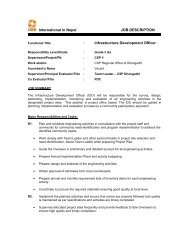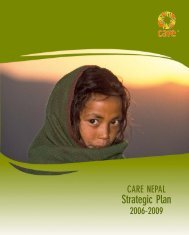Untitled - Care Nepal
Untitled - Care Nepal
Untitled - Care Nepal
You also want an ePaper? Increase the reach of your titles
YUMPU automatically turns print PDFs into web optimized ePapers that Google loves.
Table 8: Supportive factors<br />
SN<br />
Group or Event N=54 %<br />
1 Saving and Credit group/ Cooperative<br />
2 Mothers and women groups<br />
3 Unity of women /Parma<br />
4 Not supported<br />
5 Social structure (School, Health Post)<br />
6 Popular (Janamukhi) Education Center<br />
Sources: Free-listing with 54 women<br />
21<br />
34<br />
4<br />
11<br />
5<br />
2<br />
38.9<br />
63.0<br />
7.4<br />
20.4<br />
9.3<br />
3.7<br />
It was found, women felt good while talking<br />
and singing the songs with their friends<br />
during the parma. Majority of the women<br />
were engaged in different nature of women's<br />
groups. Some of them were in saving and<br />
credit groups from where they received<br />
financial support in minimum interest.<br />
While, some others were in mothers group<br />
and women were supported if there was<br />
any injustice to them by family members<br />
and community people.<br />
CONSEQUENCES FOR<br />
PSYCHOSOCIAL<br />
WELLBEING<br />
A majority of the women mentioned<br />
different psychosocial problems which<br />
were the results of social issues such as those<br />
discussed above. For most gender based<br />
discrimination, societal structure and<br />
poverty has been the major cause of their<br />
psychosocial problems. Women played the<br />
role of subordinate in their homes. Some<br />
shared that after their husbands returned<br />
home from drinking alcohol and gambling,<br />
women reported to be frightened by the<br />
behavior of their husbands. Often women<br />
were dominated by men saying that they<br />
could not do anything and some husbands<br />
accused them of planning to elope if they<br />
talked with other men. Women also<br />
mentioned that they had fear of being<br />
sexually exploited or abused while<br />
collecting grass and wood in the jungle.<br />
It was identified that most of the symptoms<br />
reported by women were related to<br />
emotions which are placed in the heart (man<br />
in <strong>Nepal</strong>i language). Anxiety (chinta), fear<br />
(dar), sense of isolation (eklopan), sadness<br />
(dukha, pir) and sleeplessness (anindra) are<br />
commonly reported psychological<br />
problems of women. As reaction to their<br />
problems women reported becoming angry<br />
with family members and not wanting to<br />
listen to any one. Symptoms were reported<br />
differently but the causes mentioned were<br />
often similar.<br />
28<br />
Psychosocial Issues of<br />
Women affected by conflict


